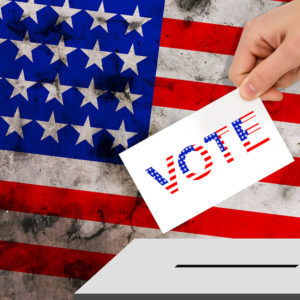The U.S. House of Representatives passed H.R. 4, also known as the John Lewis Voting Rights Bill, last week with the support of local Democrats. But few voters in the Delaware Valley are aware of what it would mean to local elections.
The bill, which the House approved in a partisan 219-212 vote, is part of an ongoing effort by Democrats to gain more federal control over election law, something traditionally left to state and local governments. The bill is named in honor of civil rights activist and Rep. John Lewis (D-Ga.), who died last year.
Reps. Chrissy Houlahan (D-Chester), Madeleine Dean (D-Montgomery), and Mary Gay Scanlon (D-Delaware Co.) supported the measure while Rep. Brian Fitzpatrick (R-Bucks) opposed it.
“This bill would make it harder for states to maintain accurate voter lists and require voter ID—an idea supported by 80 percent of Americans,” Fitzpatrick said. “I look forward to working with my colleagues on bipartisan solutions to ensure we are expanding access to voting while upholding the integrity of our elections.”
The biggest part of the bill reestablishes preclearance requirements for local and state election boards. Preclearance requirements force local and state election boards to clear any changes to an election procedure with the federal government first. Most of the states impacted by these rules are in the South, along with California and New York. The U.S. Supreme Court allowed those requirements to be removed following the Shelby County v. Holder decision in 2013.
However, as Fitzpatrick noted, H.R. 4 would require preclearance for a proposed voter ID requirement by any state. Earlier this summer, members of the Pennsylvania legislature sought to introduce voter ID requirements as part of an election reform bill that was vetoed by Gov. Tom Wolf. Wolf has since indicated he’s open to adding some ID requirements, but even if he and the GOP-controlled legislature reached a deal, under H.R.4 Pennsylvania would still have to get permission from the federal government to enact it.
The same is true for maintaining accurate voter records. Pennsylvania is notorious for out-of-date and inaccurate voter rolls.
Senate Minority Leader Mitch McConnell has called the election overhaul bill a Democratic power grab.
“They want to mandate no-excuse mail-in balloting as a permanent norm, post-pandemic,” McConnell said.
Also included in the bill is the Protect the Youth Vote Act, which would force states to allow out-of-state college students to vote where their campus is located, even if that isn’t their permanent residence. Although that would be a change in some states, Pennsylvania already allows out-of-state students to vote in local elections, without an ID, if they choose to.
Kadida Kenner, director of the New Pennsylvania Project, is a staunch supporter of H.R 4, saying it will help expand voting opportunities for myriad groups.
According to the New Pennsylvania Project’s website, the group “civically engages, registers, mobilizes and empowers often-ignored constituents, especially the youth, and communities of color in rural, urban, and suburban Pennsylvania in a year-round effort to change and expand the electorate in the commonwealth.”
Some local residents object to college students helping choose local school board members or state representatives, arguing students don’t have a vested interest in the community and don’t have to live under the laws and tax policies they help set.
Chester County Democratic Chair Charlotte Valyo doesn’t agree.
“Young voters who elect to vote where they attend school are attuned to local issues and will be informed voters,” Valyo said. “We are committed to ensuring that everyone legally eligible to vote can vote. We have always believed access to voting should be easily and equally accessible.”
According to the 2020 Census, Pennsylvania has a voting-age population of roughly 9,621,998. College students make up 715,030, or 7.4 percent of that total. Joe Biden won Pennsylvania by less than 81,000 votes.


